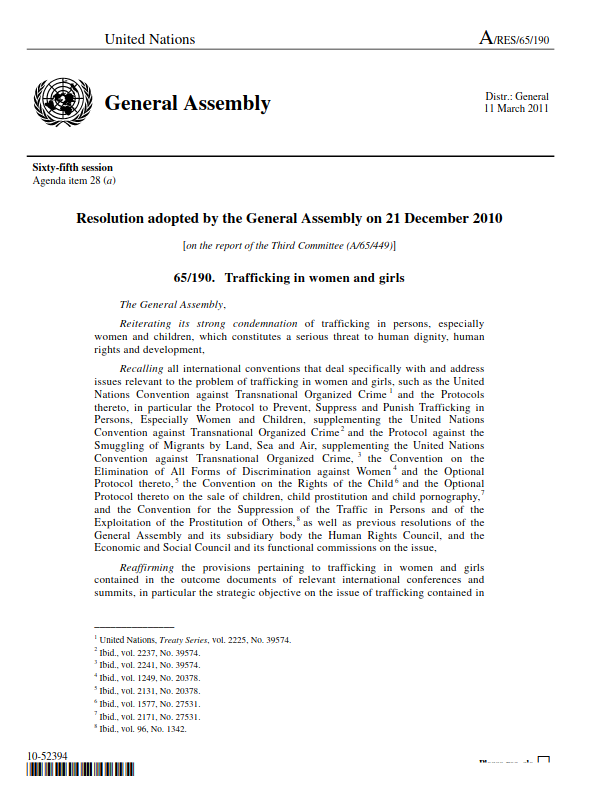2011 Resolution on trafficking in women and girls
Analysis of precedential value
The UN General Assembly adopted this resolution without a general vote in December 2010. The General Assembly is the preeminent governing body of the UN system and consists of all 193 UN Member States.
Used as precedent
gender equality, positive legal determinants
“Also calls upon Governments to take appropriate measures to address the factors that increase vulnerability to being trafficked, including poverty and gender inequality, as well as other factors that encourage the particular problem of trafficking in women and girls for prostitution and other forms of commercialized sex, forced marriage, forced labour and organ removal, in order to prevent and eliminate such trafficking, including by strengthening existing legislation with a view to providing better protection of the rights of women and girls and to punishing perpetrators, including public officials engaging in or facilitating human trafficking, through, as appropriate, criminal and/or civil measures.” (paragraph 8))
human rights
“Urges Governments to devise, enforce and strengthen effective gender- and age-sensitive measures to combat and eliminate all forms of trafficking in women and girls, including for sexual and economic exploitation, as part of a comprehensive anti-trafficking strategy that integrates a human rights perspective, and to draw up, as appropriate, national action plans in this regard.” (paragraph 10)
“Urges Governments to provide or strengthen training for, and to raise awareness among, law enforcement, judicial, immigration and other relevant officials on the prevention and combating of trafficking in persons, including the sexual exploitation of women and girls, and in this regard calls upon Governments to ensure that the treatment of victims of trafficking, especially by law enforcement officials, immigration officers, consular officials, social workers and other first response officials, is conducted with full respect for the human rights of those victims and with gender and age sensitivity and observes the principles of non-discrimination, including the prohibition of racial discrimination.” (paragraph 23)
gender equality
“Also urges Governments, in cooperation with intergovernmental and non-governmental organizations, to support and allocate resources to strengthen preventive action, in particular education for women and men, as well as for girls and boys, on gender equality, self-respect and mutual respect, and campaigns, carried out in collaboration with civil society, to increase public awareness of the issue at the national and grass-roots levels.” (paragraph 11)
positive legal determinants
“Urges Governments to develop educational and training programmes and policies and to consider, as appropriate, enacting legislation aimed at preventing sex tourism and trafficking, giving special emphasis to the protection of young women and children.” (paragraph 14)
“Calls upon all Governments to criminalize all forms of trafficking in persons, recognizing its increasing occurrence for purposes of sexual exploitation, commercial sexual exploitation and abuse, sex tourism and forced labour, and to bring to justice and punish the offenders and intermediaries involved, including public officials involved with trafficking in persons, whether local or foreign, through the competent national authorities, either in the country of origin of the offender or in the country in which the abuse occurs, in accordance with due process of law, as well as to penalize persons in authority found guilty of sexually assaulting victims of trafficking in their custody.” (paragraph 16)
“Calls upon all concerned Governments to allocate resources, as appropriate, to provide access to appropriate programmes for the physical, psychological and social recovery of victims of trafficking, including through job training, legal assistance in a language that they can understand and health care, including for HIV/AIDS, and by taking measures to cooperate with intergovernmental and non-governmental organizations to provide for the social, medical and psychological care of the victims.” (paragraph 20)
